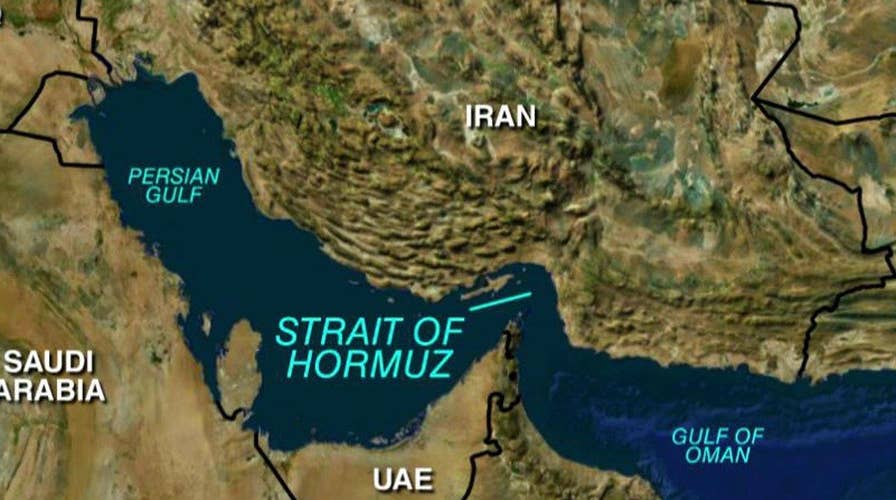Iran fires rockets within 1,500 yards of US coalition ships
Garrett Tenney reports from Washington
Despite the Obama administration touting its Iran nuclear deal as a triumph of diplomacy that finally thaws a four-decade freeze, Tehran appears to be doing all it can to keep the flames of confrontation burning.
The latest challenge was a missile launch over the weekend less than a mile from a U.S. aircraft carrier -- which came on the heels of two other similar incidents, two ballistic missile tests, and the harsh treatment of American prisoners including a Washington Post journalist.
These provocations, with the country potentially weeks away from receiving billions in sanctions relief under the nuclear deal, are fueling renewed concerns in Washington about whether Iran will be held to account for violations.
"Missile-tests, cyber-attacks, Americans taken hostage, and now this,” House Foreign Affairs Committee Chairman Ed Royce, R-Calif., said in a statement Wednesday. “Until the Obama administration starts holding the Iranian regime accountable, we’ll see more of these hostile acts that put American lives in danger.”
The most recent confrontation occurred Saturday, when five Iranian Revolutionary Guard vessels approached the USS Harry S. Truman, and one of them fired multiple unguided missiles within 1,500 yards of the U.S. aircraft carrier transiting the Strait of Hormuz. It was the third such provocation in the past 14 months, a spokesman for the Navy’s 5th Fleet, responsible for operations in the Persian Gulf, told Fox News.
“It’s getting closer,” Cmdr. Kevin Stephens said in discussing this trend of Iranian provocation near U.S. aircraft carrier battle groups.
In April, as the USS Theodore Roosevelt exited the Strait of Hormuz to pursue an Iranian flotilla carrying weapons in the direction of Yemen, a group of Iranian Revolutionary Guard small boats launched 11 unguided rockets five nautical miles from the aircraft carrier, Stephens said. One nautical mile equals 1.151 miles.
In October 2014, a Navy helicopter from the USS George H.W. Bush also observed Iranian small boats launching several unguided rockets about eight nautical miles away, he said.
The group of missile boats that approached the USS Harry S. Truman, as well as her escort ships, the day after Christmas launched missiles within 1,500 yards of the aircraft carrier following an impromptu announcement over bridge-to-bridge maritime radio just 23 minutes earlier. The first missiles were launched from inside internationally recognized maritime traffic lanes and Omani territorial waters, according to Stephens.
The Iranian missiles were fired just after Truman and her escort ships exited the Strait of Hormuz, according to a defense official. The American aircraft carrier had helicopters in the air after the launch “closely observing” the boats, which passed away from the U.S. and French Navy ships. F-18 Super Hornets also were ready to launch from Truman had the situation escalated further, the defense official said. The Strait of Hormuz connects the Gulf of Oman to the Persian Gulf.
“The [Iranian Navy’s] actions were highly provocative. Firing weapons so close to passing coalition ships and commercial traffic within an internationally recognized maritime traffic lane is unsafe,” Stephens said.
The incident, first reported by NBC News, marks another flare-up as the Iranian nuclear pact is poised to take full effect.
Ahead of the planned sanctions relief, Iran earlier this week Iran shipped 25,000 pounds of low-enriched uranium to Russia as part of the agreement.
Secretary of State John Kerry called the transfer a “significant milestone.”
Yet on the sidelines, congressional lawmakers have been fuming over a series of missile firings.
Fox News was first to report the Nov. 21 launch of a Ghadr-110, a medium-range ballistic missile with a range of 1,200 miles, capable of striking U.S. military assets in the region as well as Israel.
Following the Fox News report of the second ballistic missile launch, U.S. Sen. Kelly Ayotte, R-N.H., wrote a letter to President Obama, signed by 35 of her GOP Senate colleagues, calling on the administration not to lift sanctions on Iran.
The launch in November followed a much more publicized ballistic missile launch inside Iran in October, which drew condemnation from U.S. Ambassador to the U.N. Samantha Power. The Iranian military released a video of the October launch as well as a video showing an underground network of tunnels where missiles are allegedly being stored.
Earlier this month, the United Nations said Iran had violated U.N. Security Council resolutions following the October launch. It is unclear how far the United Nations or United States will go to respond to the violations – though on Wednesday, the Treasury Department notified Capitol Hill of new pending sanctions against 11 individuals and entities accused of supporting Iran’s ballistic missile program.
Twenty-one Democratic senators also wrote to Obama last week voicing concerns about those missile launches.
“If there are no consequences for this violation, Iran’s leaders will certainly also question the willingness of the international community to respond to violations of the [nuclear agreement],” they wrote.
Sen. John McCain, R-Ariz., chairman of the Senate Armed Services Committee, pointed to the latest rocket launch in the Strait of Hormuz in warning Wednesday against rushing into sanctions relief.
“[T]he Administration continues to turn a blind eye to Iranian saber rattling,” he said in a statement. “A rush to sanctions relief threatens to embolden an increasingly aggressive Iranian regime that has no intention of normalizing relations with the West or of retreating from a malign policy intended to destabilize the Middle East.”
Some lawmakers are pushing for Congress to renew an expiring Iran sanctions law, as leverage in case the U.S. needs to snap back sanctions should Iran violate the deal.
Yet Iran also is fuming over a Congress-passed law restricting people who have recently visited Iran or people holding dual Iranian citizenship from visiting the U.S. without a visa, a move the Iranian government called a violation of the nuclear agreement.
Foreign Ministry spokesman Hossein Jaberi Ansari said at a news conference that “any steps taken outside the agreement are unacceptable to Iran, and Iran will take its own steps in response where necessary."
Fox News’ Kara Rowland contributed to this report.





